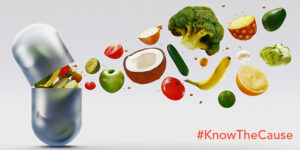

Our bodies require certain nutrients on a regular basis in order to maintain proper function.
In addition to the macronutrients, protein, carbohydrates, fat, and fiber, our body needs a wide array of vitamins, minerals, micronutrients and trace elements to operate at its peak performance.
It is easy to get all of these nutrients supplementally, such as in a multi-vitamin. For most of us, multivitamins are a good idea, simply because it is difficult to ensure that you get everything you need via diet alone, much less in amounts have proven therapeutic value.
However, food still remains the best way to get all the necessary nutrients into your system.
Below are a few vitamins and minerals that often get talked about, and a brief explanation of why they are important to get in your diet. Many of the foods on the Kaufmann Diet are excellent sources of these and other nutrients. Be sure to include these and other nutritionally dense foods in your diet as often as possible.
Vitamin A
Vitamin A is a powerful, fat-soluble antioxidant that is associated with anti-aging, benefits for eye health, immunity, healthy skin and neurological function. Vitamin A also promotes skin and hair growth and may protect against cancer.
Vitamin A comes in two forms, retinol (from animal sources) and beta carotene (from plant sources). Good sources of Vitamin A include carrots, sweet potatoes, green leafy vegetables, eggs, liver, and squash.
Vitamin B
B vitamins are a water soluble group of 8 vitamins that are important for a variety of functions, including cellular metabolism. These vitamins include thiamin, riboflavin, niacin, folate, B6, B12, biotin and pantothenic acid.
Each B vitamin performs specific functions in the body, but they work in concert with one another, as well. They are key for energy production and a number of other tasks.
Many types of meat and nuts, as well as green leafy vegetables and eggs, are rich in certain B vitamins.
Vitamin C
Vitamin C is perhaps one of the most well-known nutrients. It is a water-soluble antioxidant. Vitamin C has a number of benefits for the body, including benefits for the heart, immune system and possesses the ability to help repair damaged tissue.
Vitamin C is readily available in many kinds of foods, including, apples, broccoli, berries, cauliflower, lemons, limes, leafy greens, tomatoes and green peppers.
Vitamin D
Vitamin D is a fat soluble hormone that assists the body in absorbing nutrients like calcium, magnesium and phosphate. Vitamin D is available in fatty fish like salmon, eggs and beef liver, but we produce this nutrient when our skin is in contact with sunlight.
This important nutrient is critical for maintaining bone health.
Magnesium
Magnesium is critical for heart health; it maintains proper blood pressure, and keeps the heartbeat steady. Unfortunately, studies indicate that the majority of Americans are deficient in this crucial nutrient. Deficiency often results in anxiety, sleeplessness, hypertension, cardiovascular disease, kidney and liver damage, nutrient deficiency among other problems.
Foods high in magnesium are nuts, seeds, fish, whole grains, avocados, and yogurt.
Potassium
Potassium is another key nutrient necessary for heart health, muscle function, kidney function and brain function. Potassium helps keep the body hydrated and electrolytes in balance.
Foods high in potassium include spinach, avocado, salmon, and coconut water.
Doug Kaufmann has written many books that cover a full range or health issues. Find out which of his books best suits you by clicking the button below.
Doug Kaufmann developed his diet after years studying the clinical effects of pathogenic fungi on the body. Fungi and yeasts can become parasitic organisms on and inside our body, causing health problems that can be difficult to diagnose. Learn more about the Kaufmann Diet, change your life and know the cause.
We encourage all visitors to this site to take some time and study these technical articles prior to initiating lifestyle changes, including dietary changes and to do so with their physician’s awareness and approval. The articles posted in this link are scientific and with few exceptions are taken from medical journals familiar to healthcare workers.
Looking for help assembling antifungal Kaufmann Diet approved recipes for breakfast, lunch or dinner? We have several videos, books and recipe write ups here on Know the Cause that will help your health journey. The recipes in this section are so good, you’ll feel like you’re indulging. No sacrifice needed! Enjoy.
© 2024 Mediatriton Inc. All Rights Reserved • Website by Skynet Solutions